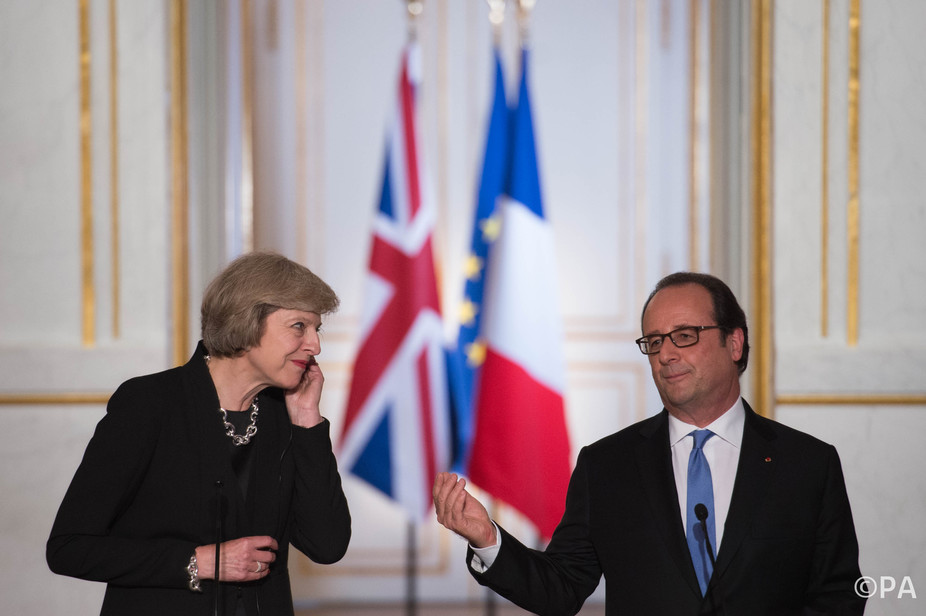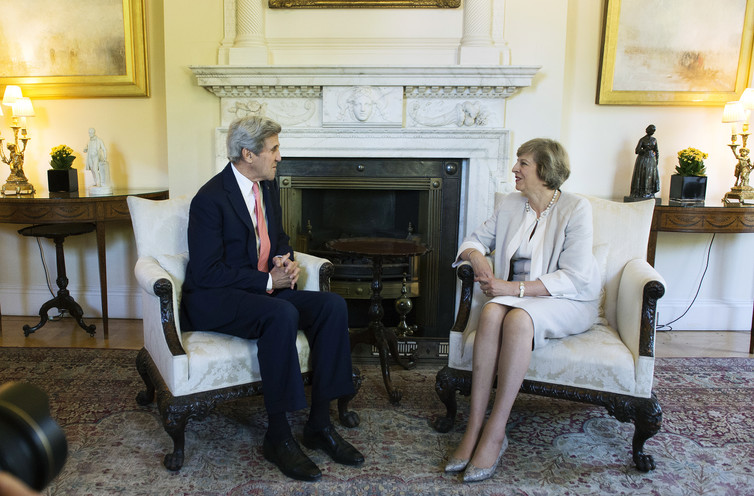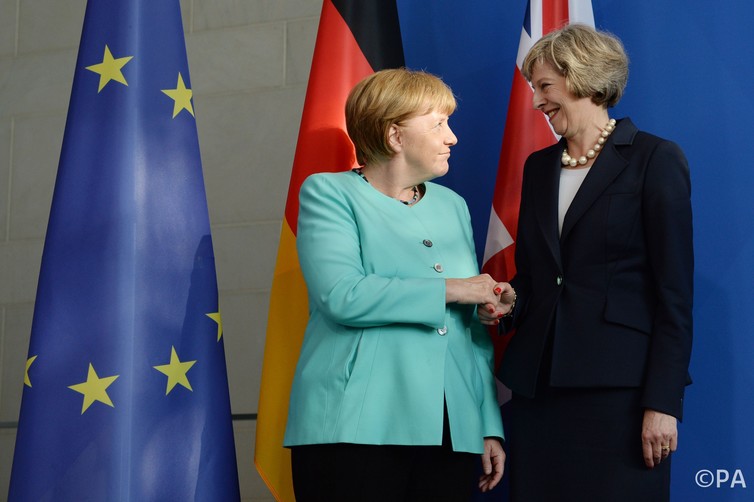
Date: 2024-12-21 Page is: DBtxt003.php txt00011827
Country ... UK
Foreign Complexities
The world according to Theresa May – China, the US, Europe and the new British PM
Burgess COMMENTARY
Peter Burgess
The world according to Theresa May – China, the US, Europe and the new British PM

I can’t understand a word you’re saying, François. PA/Stefan Rousseau
When Theresa May became UK prime minister she inherited many contentious issues on the international stage, thanks to the British vote to leave the EU. But the diplomatic matter to cause her real problems concerned nuclear power.
After a decade of talks, it looked as though the UK was finally about to seal the deal on building a nuclear power station at Hinkley Point in Somerset. Then, at a crucial moment, May put the deal on ice, to the great displeasure of Chinese investors.
In the immediate wake of the announcement, China’s ambassador to the UK urged the UK to press ahead as planned, warning that relations between the two countries were “at a crucial historical juncture”.
Delicate moment
The situation raises interesting questions about May’s foreign policy aims. David Cameron’s government – George Osborne in particular, as chancellor of the exchequer, spent a great deal of time courting China. Osborne seemed on a relentless mission to win Chinese investment for the UK. The global financial crash in 2008 ensured that opportunities for foreign investment were severely restricted, but the Chinese government and its investing partners were keen to fill some of that gap. They signed deals which would ensure financial support in difficult circumstances and invested in some key brands, such as a £7.9bn in Italian firm Pirelli.
But such investment came amid loud calls for Britain to speak out about Chinese human rights violations and a desire for the British government and the royal family to maintain a good relationship with the Dalai Lama.
In May 2012, David Cameron and the then deputy prime minister Nick Clegg met the Dalai Lama in London, which angered the Chinese government. It was never made explicit, but Chinese investment in Britain was considerably lower than into other European nations.
While relations have improved between the two nations since then, delaying the Hinkley decision could easily undermine this blossoming relationship. May has already moved to minimise the damage to Anglo-Chinese relations by writing to the Chinese premier to assure him of Britain’s desire to work closely with China in the future. She is to travel to China in September to make a bolder statement to that effect.
Stronger Britain?
In wider terms, very little is known about Theresa May’s foreign policy views, even though she was a senior minister under David Cameron for more than six years. A longer campaign for the Conservative party leadership might have encouraged more discussion of foreign policy priorities, but May wiped out her rivals before that could happen.
Nevertheless, some conclusions can be drawn based on the actions of the Cameron government and May’s wider political views.

I would have called sooner John, but it’s been a busy time. EPA/Andy Rain
May is a fairly traditional right-wing Conservative. She attempted to present herself otherwise during the leadership campaign, but she is certainly to the right of David Cameron, who was a more centrist figure. Traditionally, we would expect a right-wing Conservative to be pro-American, pro-NATO and favour a strong Britain, as well as being traditionally apathetic towards the EU and development aid funding. While development aid is guaranteed for the moment by legislation passed by her predecessor, the former is obviously a political hot potato which May will need to handle with care.
May made her first phone calls as prime minister to Berlin and Paris – and only later to Washington. Those first calls to Britain’s main European allies were certainly necessary given that Britain had just voted for Brexit, but the move also perhaps demonstrated a slightly more reticent attitude to the US.
While the special relationship between the UK and US remains the cornerstone of British foreign policy, as demonstrated by UN Security Council voting patterns, NATO agreements and day-to-day interactions, the tenure of Barack Obama has not been easy for the British government.
Obama is the first US president to focus the majority of his foreign policy attention on Asia. That is not to say that Obama has considered Europe irrelevant, simply that he has been looking towards China as the emerging great power far more than his predecessors needed to. Ditto the emerging BRIC powers. Relationships with China and Russia have been central for several years and the UK has seemed less important than other international partners.
The Clinton question
If Hillary Clinton is elected in November 2016, we can expect to see some considerable continuity in foreign policy terms with the Obama administration. It is very difficult to know what a Trump administration would consider foreign policy goals and the actions it would undertake to secure them.

You’re my favourite Angela, really. PA/Stefan Rousseau
An increasingly aggressive foreign policy from Vladimir Putin’s Russia means that the May government will remain focused on Eastern Europe, where the priority is to ensure the security of the borders of smaller nations close to Russia and to prevent Moscow from interfering in the affairs of sovereign nations. A Soviet-style revival in Eastern Europe is becoming an increasingly worrying prospect.
With Brexit looming and uncertainty over the US presidential election in November, May will be keen to build new relationships and strengthen existing ones, but there is little evidence to suggest that her foreign policy aims will differ substantially from her predecessor.
The main focus for the May government will be untangling Britain from the EU, and that will certainly inform her wider foreign policy. Her government will need to find a way to leave without completely alienating its European neighbours. As well as being geographically closest, these are Britain’s main allies and, crucially, its customers.
Author Victoria Honeyman Lecturer in British Politics, University of Leeds
Disclosure statement Victoria Honeyman does not work for, consult, own shares in or receive funding from any company or organization that would benefit from this article, and has disclosed no relevant affiliations beyond the academic appointment above.
Partners University of Leeds University of Leeds provides funding as a founding partner of The Conversation UK.
Republish this article We believe in the free flow of information. We use a Creative Commons Attribution NoDerivatives licence, so you can republish our articles for free, online or in print.